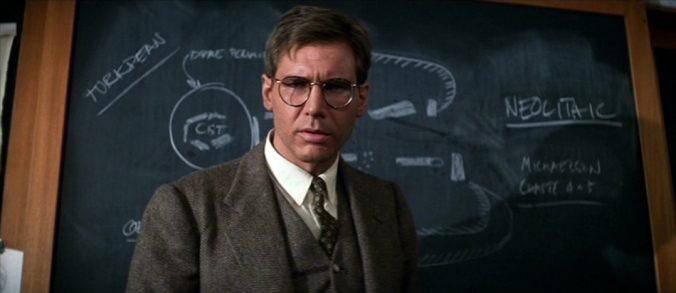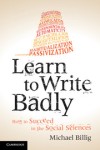Jonathan Neale
This post will be of interest to only some of our readers. But we hope it will be very useful for them.
It is not easy to be both an academic and an activist. The values, the audiences and the constraints are different. Sitting down to write, you can feel yourself pulled in two different ways. The result is often muddled thinking and murky prose. There is too much ranting for an academic audience, and too much gobbledygook for the movement. In many cases, there is no prose at all, only silence, and pages crumpled in the wastebasket or erased on the screen.
The first half of this post offers some advice that can make writing easier, faster and more useful. The second half explains why universities make activists feel stupid, how they do it, and how you can cope.
[This post is adapted from a much longer piece first published in Heidi Armbruster and Anna Laerke, eds. Taking Sides. You can download the full piece here: Ranting_and_Silence_Jonathan_pdf-libre (1).]
PART ONE: SOME ADVICE FOR WRITING
The most useful thing I have learned in my own life is to split, writing one thing for the academy and another thing for the movement. Ordinarily, graduate students and young teachers try to write for both. In a sense, they are trying to write for people like themselves. This strategy puts them in a very tight and conflicted space. As they write each sentence, they notice it is too direct for the professors, or too convoluted for the activists – or, often, both at once. So they rewrite the sentence and then delete it. Or they write an academic paper, in academic language, while underneath there is a fury bubbling to be free. Suddenly they are ranting, and then, embarrassed, they return to silence.
The contradiction is real, and not their fault. One solution is to write for both audiences separately. That may seem like more work, but it is not. If you can write happily for both audiences, you can write twice as much in less time. Splitting your audience frees you to write for other activists, in language they can use, sharing assumptions and loyalties, directly to their concerns. The academy will not contaminate this writing.
Simultaneously, it frees you to write for academics. And that feeling of silence, of omission, of lack of integrity, disappears. It is still possible to write with integrity, not to conceal or lie. The point is that this kind of writing is not a means by which to change the world. It is a thesis, or a paper, or a monograph. The aim is to write something you are not ashamed of in the hope that you will get a job. You need not harbour illusions: an article in an academic journal will not change the world. However, it will inform some people and be valued by those academics who think.
Other kinds of writing will help change the world. The movements of the oppressed always need intellectuals. Whereas the mainstream has bright and capable thinkers by the tens of thousands, our side has handfuls.
Many universities are full of people who sympathize with mass movements and march on the big demonstrations, but very few of those people are organic intellectuals of the movement. We need every one we can get, to write for our publications, speak at all the small meetings, proofread the leaflets, and use their brains on our committees. Above all, the movements need theory. A movement from below must understand the world in its complexity, or be smashed. It must also know, amid all that complexity, the simple and most important link in the chain, the place to fight.
The most useful thing a radical intellectual can do is to identify one of the key arguments in a mass movement, then think about it as hard as possible and write about it, intervening in the movement. Even the writer who gets it wrong will learn by trying. To intervene in arguments, you have to understand the movement. That means reading the articles and books from inside the movement. It also means going to the meetings, joining the actions, marching, occupying, and above all listening. The arguments begin in the meetings, and around drinks afterwards, before they happen in print. Only by being part of a movement can you learn how to talk to activists.
I am not talking about intellectual work that explains the oppressed or justifies them before the academy. Rather, I am talking about writing as part of arguments among the oppressed about how to fight.
Differences from Academic Writing
 There are important differences between this sort of writing within a movement and academic writing. One difference is time scale. It takes an academic at least four years to research and write a thesis. In the next couple of years she publishes a couple of articles in academic journals. Five, ten or fifteen years after beginning, she publishes a book. This is useless to the movement.
There are important differences between this sort of writing within a movement and academic writing. One difference is time scale. It takes an academic at least four years to research and write a thesis. In the next couple of years she publishes a couple of articles in academic journals. Five, ten or fifteen years after beginning, she publishes a book. This is useless to the movement.
When writing politics, you write now. What is most important to understand, and to act on, is that which is changing. If you learn something in your studies, the movement needs to know that now. To reach the activists, you need to publish in their journals or websites. They will publish an article quickly, within days or weeks. The academy will pay no attention whatsoever, and it is probably even best to leave such activist writing off your CV.
A second difference is in object. For an academic piece in anthropology, the object is likely to be anthropology. There is nothing wrong in that. When writing for a radical audience, though, the object is the struggle, and the background is a tradition of radical theory.
A third difference is in audience and style. Look at the difference between activist Marxists and academic Marxists. Activists like Marx, Lenin, Luxemburg and Trotsky are easier to understand. This is because they wanted to be understood because they wanted to convince the activists in the movement to do something. The great majority of activists and local leaders in their movements were workers who had left school at a young age. Therefore, they wrote in ways those activists could understand, treating their audience as intelligent and deeply committed, but not academically trained.
Or look at the difference between the early writers of women’s liberation, who wrote to persuade a mass movement, and most writing by academic feminists today.
Academic writing, including feminist or Marxist academic writing, seeks a different audience from activist writing, in a different way. Students do not have to be persuaded. They are assigned reading and examined on it. If they find the reading difficult, that is not evidence of the stupidity and clumsiness of the author. Instead, the student reader is presumed thick and awkward.
It is sometimes assumed that the more sophisticated the thinking on the page, the harder it will be to understand. There is no evidence for this assumption, but it is a hardy one in academic circles. Almost never is an academic heard to say, ‘I tried reading that book, but it was too hard for me, so I stopped. I don’t want to waste my life reading someone who can’t write.’
Academic language is used to subordinate, to frighten students, to obscure, to compete and to exclude. It is often opaque, because it is not for looking through. Activist language is meant to be understood and used.
Selecting an Imagined Reader
Because your audience is different for activist writing, it is very helpful to pick an imagined reader – not an abstract one, but a particular person the writer knows.
Picking that person is particularly important in writing for the movement. If you do not pick that person, your unconscious will be secretly writing to please and impress some professor. And your language will go all to hell.
My imagined reader as I wrote my first book about hospital unions was my friend Alistair, who was a shop steward for engineering workers and electricians in a hospital. A union militant, he had left school at sixteen, served an apprenticeship, and come to hate management. He distrusted the left and all rhetoric, did not read widely, and was highly intelligent.
Once you select the imagined reader, the writing gets easier. You know what you can assume, what you have to explain, and what you have to argue for. You also know what style to use – not so simple as to make readers feel condescended to, and not so baroque as to make them feel excluded. As you write you can also hear the questions they would ask, the objections they would make, the arguments that must be met. There is no call to obsess over those readers who won’t like the book anyway.
The trick is always to pick a particular, named reader, not a representative of some category. The book need not be shown to that person until it is published. Your imagined reader might not like it, and that might silence you. Rather, the imagined reader is a useful tool to help write for a wider audience.
You can also use a selected imagined reader to write a thesis or an academic article. This selected academic reader, like the activist reader, should be on the writer’s side. Fluency is spurred by writing for academic equals who are willing to accept what is said. It is a mistake to write for superiors, particularly if the writer is nervous about impressing them. Many of them dislike passionate activists, and it is fruitless to tie yourself in knots trying to please them. Colleagues who sympathize are a preferable target audience. The writing will be better and may actually be more likely to impress the professors.
Bad First Drafts
Another useful idea is that it is desirable to write shitty first drafts. I take this point from Anne Lamott’s Bird by Bird, one of the two best books I know on how to write. (The other is Stephen King, On Writing.) Lamott says that most people who try to write hear critical voices in their heads telling them they’re writing shit. Those voices are right. First drafts are not good. If they were, they would be the final draft. The goal of writing the first draft is to get something down. The later drafts are for making it good.
There are two mistakes a writer can make when they hear that voice say, ‘This is shit’. One mistake is positive thinking. The writer tells herself that the critical voices are destructive, and she must have faith in herself. The flaw in this strategy is that the voice is right, and positive thinking will eventually crumble before reality. The smart thing to do is not worry that it is shit, and keep going.
The other mistake is to stop and rewrite until it is good. Finishing a bad first draft is the single largest hurdle in writing a good book. Most people who complete a first draft of a thesis, no matter how bad, finish the thesis. Most people who do not finish wrote some early chapters and got lost rewriting them.
So my advice is to write shitty first drafts, and be pleased. This is good counsel for any writer, but it is particularly important to radicals inside a university, for several reasons. They are under considerable pressure and the critical voices in their heads are likely to be loud. They may have a critical supervisor. Both the pressure and the confused nature of much academic writing mean that their first draft is also likely to be muddled and chaotic. Some of the rest will be hysterical rant.
Moreover, any writer has trouble saying things outside what is normally allowed. This applies when writing into the unconscious, and when writing outside the political rules, for it is frightening to write in these ways. If the fear of saying the unsayable is joined to the fear of writing badly, it becomes very difficult to write. To allow the devil to speak, one must get out of his way. The result may be brilliant, or a mess, or both. But once the first draft is done and the second draft begun, then the critical inner voice is suddenly a friend: before, it shut the writer up; now, it allows him to edit. Write in fire, rewrite in ice.
PART TWO: THE CLASS STRUGGLE IN INSIDE YOUR HEAD,
OR HOW THEY MAKE YOU FEEL STUPID
To understand how to write in universities, a radical needs first to understand the forces that try to silence her. So here I will not start with the confused student at the desk, comfort eating to avoid writing. Instead I start with the roots of her anxiety, which I believe lie in the contradictions in university education in a capitalist society.
Universities do three central jobs in a capitalist system. First, universities and schools justify the division of labour in the whole society. Most people have the innate skill to do most jobs. Almost anyone who went to Eton can become a surgeon or an airline pilot. But the structure of the economy means that the best-paid and most satisfying jobs are in short supply. There would be a revolt if jobs were simply handed out on the basis of who your parents know and how much money they have. Instead, jobs are rationed on the basis of education.
In practice, how well people do in education is more dependent on who their parents are and how much money they have than it is on anything else. But there is also an element of personal talent and hard work, so exams and grades serve to turn an unfair class system into one based on the notion that lack of success is the individual’s fault. Many people hate their jobs but know they are trapped because they were not smart enough or did not work hard enough in school.
This rationing and justification works at every level of the system. It is often particularly confusing for graduate students who, having done well in exams, now find it hard not to believe in the validity of marks. From their point of view, it was not money or luck that got them an A. It was an inner something wonderful.
Then they come to graduate school, where the odds are they will fail. The PhD is a preparation for a small number of jobs, much smaller than the number of people writing theses. So there are many unnamed pressures on all candidates not to complete their thesis, or to disappear once they have done so. For people who believe in the system, it can be shattering when the system says they are stupid.
The insecurity in the system runs deep and wide. I believe professors of history or English at Oxford and Harvard lie awake in bed at night worrying that the professors at Cambridge and Yale are smarter.
This insecurity has consequences for the activist who is also an academic. It means that when her seniors disapprove of her work politically, they need only tell her she is not smart enough. She will internalize that judgement, just as she internalized the earlier As.
The second job universities do is to interpret the world and train new professionals in ways that will be useful to business and governments. The third job is to confuse people about reality in order to keep the capitalist system going.
The second and third jobs pull in different directions. Their relative importance depends partly on the nature of the discipline. The mathematics and engineering of building a bridge, for instance, must not be overloaded with ideology. No one wants the bridge to fall down – the people on the bridge, the government, and the corporations all want honest mathematics. The same is true of most chemistry, physics and geology.
The necessity of justifying the system bears more strongly in other areas of science. Genetics, for instance, is torn between opposing forces. On the one hand, there is a large amount of money to be made out of good genetics that produces new products. On the other, these days a great deal of inequality between individuals in society is justified by the idea that some individuals are born different. Genetic science is under constant pressure to find genes that underlie various forms of inequality. Thus scientists who produce nonsense genetics will be rewarded along with those who make money; meanwhile a constant tug-of-war is waged within the discipline between money and nonsense.
Also relevant is the question of funding in science and engineering. There is a lot of money for nuclear physics and surgery, little for wind power and tropical diseases. Over time, this structures the questions that can be asked and the things that can be known. However, because capitalism was born as a system for accumulation, for producing with ever greater efficiency, so on balance and in general those who control capital want serious science.
The social sciences are a different matter. Here, it would seem, the capitalists’ need to control people is more important than their interest in accurate descriptions of society. This means they are greatly concerned to invent ideologies that sustain their privileges. These exist in tension with the need for understanding. The elites of capitalism, the actual human beings who run the system, need others of their kind, new blood, as well as a clear understanding of their society, economics and politics. They need universities to prepare new rulers and assistant rulers. Without these props, their companies will go broke, their country lose power to others and their whole system come under strain.
To simplify a complex reality, the powerful would like universities that train smart people to work at the top and stupid people to do what they are told. But this is difficult. The people who study economics at the University of Texas El Paso can, and do, read the same books as economists at Harvard and Columbia who go on to run the World Bank. So the powerful have to lie to themselves about reality in order to lie to the rest of us.
The balance of these forces varies from one discipline in the social sciences to another. Sociology, for instance, makes a lot more sense than economics. Sociologists largely study the troubles of the poor and the problems the poor cause for governments. The people who run the system want most people to blame the poor themselves for their troubles. But because they also need people and systems to control the poor, they need social workers, parole officers and housing administrators. Those professionals have to treat the troubled with kindness while rationing what they need. At the top, the people who run the welfare state have to understand the poor in order to govern them. Sociology reflects this contradiction, producing books and articles blaming the poor, but also books and articles trying to make their lives understandable.
Many sociologists try to reconcile these two approaches. One way is to write of ‘social problems’ – this allows the sociologist to understand individuals’ pain while still seeing them as a problem. Another way is write with empathy for the oppressed, but always to privilege the pains of identity, race, gender and sexuality over the pain of class.
This contradiction at the heart of the discipline creates a space for radical sociologists. The contradiction is played out not simply inside the head of each academic, but in the contest between pieces of research. And on the edges of the liberal school, there is a contested and defensive space for the radicals.
Economics occupies a different position from sociology. Economists study capitalism itself. Almost all those in the mainstream are the custodians of the key deception in the system, the one about exploitation. The reality is that we all work, and the employers take more than their share, and the growth of the system depends on this exploitation. The surface appearance is that the boss provides the job and everyone gets paid for the work they do. Mainstream economists typically must defend this surface appearance. The cost, however, is that much of university economics makes almost no sense, which has gained it a reputation as a difficult and challenging discipline. It is hard to understand nonsense, and even harder to write it.
Negotiating Ideology
Now we need another intellectual tool – the idea that ideology is negotiated. Ideologies are built up and refined to justify the system. However, they are useless to the ruling elite if they do not become part of the thinking of the oppressed. An ideology must offer a plausible interpretation of lived experience. To be effective, it must simultaneously hide and illuminate. If it does not hide, it will not disarm the oppressed, and so it will not serve the uses of power. If it does not illuminate, the oppressed will simply discard it.
Moreover, since the oppressed are not homogenous in their employment, their position in society, their experiences or their politics, a system of domination needs different ideologies for different people. In Britain, for instance, the Financial Times provides an ideology for the powerful, The Guardian provides an ideology for teachers and social workers, and The Mirror and The Sun provide two different ideologies for manual workers.
In a similar way, sociology is directed mostly at people who will work face-to-face with the needy – sometimes revoking their parole, sometimes helping them fill out rent rebate forms. So sociology has to mix compassion for suffering with blaming the victim.
The ruling class need clarity in their thought, and they need good teachers. So there must be some space for clarity and intellectual honesty in universities. That opens the door to radical thinkers. At the same time, because ideology is negotiated, there is an ideological range in the university. The radicals enter and survive on the left of one wing of that negotiation.
The larger the independent struggle in the wider society, the greater the space for radicals. This space is real, but it also defensive and beleaguered. Universities are run by the government, by the church, by boards of rich people, or by some combination of the above. More important, in Marx’s phrase, ‘the ruling ideas are the ideas of the ruling class’. This is true in every society, and happens in a thousand ways.
It is reasonable to expect some space for radicals in universities. It would be mad, however, to expect the mainstream of university thought to become radical. Radicals are always under pressure. Like women, or people of colour, they always have to perform better – particularly if they already are women or people of colour. One of the keys to survival in this situation is to realize just how heavy is the weight of mainstream ideology on radical shoulders.
Moreover, there is a difference between how ideology works in the media and in universities. In universities students have to read what they are assigned. It does not matter if the prose is arcane, thorny, confused or incoherent. These prose styles can be taken as signs of difficulty, and therefore of complexity, sophistication and intellectual worth.
If a magazine is similarly incomprehensible, people will simply stop reading. Journalists and editors do not have to write simplistically, but they have to be clear and make sense.
In the universities ideological problems can be papered over with sentences that are hard to understand because they do not make sense. Journalists cannot do this. Instead of muddying the waters, they have to lie clearly.
In the media there is one insider knowledge, and another thing that is said to the public. This is unimaginable in universities. Senior professors do not take young lecturers aside at the beginning of their careers and explain to them that there is the sociology we tell the students, and then there is the secret true knowledge we talk about in the bar after work.
What happens in universities is something altogether more confused and confusing. People lie to themselves and each other, behind their own backs. This does not mean that there is no enforcement and management of ideology in universities, but it means that the process of management is more complex and muddled, and less visible.
For the university system to work as it does, it is necessary for the teachers to believe they are speaking their own thoughts. It is also necessary for senior scholars and management to act as if they are allowing people to think their own thoughts. It is even necessary for most senior scholars to think in their own heads that they are doing this.
However, it is also necessary to the ruling class that some kinds of thinking are encouraged, and other sorts are silenced or humiliated. So how can ideologies be enforced without anyone noticing?
University teachers are accustomed to deceiving and mystifying themselves, yet power is still exerted. This happens in several ways.
Funding is crucial. A small number of funders, particularly governments and a few foundations, control what kind of research is done, and within what framework. Young scholars may start out by applying for that money with a deep cynicism. They fill the form with words they regard as waffle and lies. They tell themselves, I will get through this and then study what I want to.
But their monographs eventually come out and validate the existence of a new, funder-created field like ‘social exclusion’. The required language of the forms leaks down through committees, introductions and reading lists, until ‘multiculturalism’ and ‘civil society’ are everywhere. Soon students are consuming as knowledge what everyone knew was hypocrisy ten years ago.
Then there is the hierarchy of academic life. Most university teachers are not part of a social elite, and most of their students are destined for ordinary white-collar jobs. However, the most prestigious universities – Oxford, Cambridge, Harvard, Princeton, Yale, and the like – have quite close ties to the government and the ruling class. They educate the children of the elite and they recruit new people to the elite. The social position, and sometimes the income, of professors at such institutions is very comfortable. The prevailing ideas suit them, feel right.
The large majority of students and university teachers have a different daily experience. Teachers at lesser colleges look to the elite institutions for intellectual validation. They assign books by people from Cambridge and Yale. They gain prestige by having a book published by Princeton University Press, not by their own institution. Their work is evaluated by journal reviewers, editors and research panels disproportionately recruited from the elite. Moreover, in any generation a large proportion of the staff at lesser colleges are recruited from among the graduate students of the elite.
All this means that the values appropriate to people close to the ruling class permeate down through academe. Graduate students, because they did well at school and got good grades, are particularly likely to internalize the values of academic hierarchy. Then they attend national and international scholarly conferences where this hierarchy is ceremonially displayed, enforced and validated.
There is also the detail of daily interaction within an institution. Here mentoring, patronage and supervision are crucial. This process can be beautiful when it works. But it also provides a large hierarchical space for disciplining the dissident. This can be done, and is most effectively done, by mixing a subtle indication of boundaries with praise and nurture. It can, however, also be done with cruelty.
Then there is the staff seminar, along with the other occasions when work is made public. In these situations it is not customary to say that a paper is too left-wing. Other strategies work better. There is the raised eyebrow in Britain, or the politely dismissive moderator in the United States.
There are also some standard intellectual ploys. One is to say that actually the reality is a good deal more complex than that described in the paper, which, of course, is always true, of every paper. It is used when the mainstream professor cannot deny the reality, or human importance, of what has been said. The effect, and the intended effect, is to make the paper giver feel stupid. It also conveniently ignores the political truth that reality is always complicated, but the choice between two sides is simple.
Another, more confrontational maneuver, is to use comments and body language to make the paper giver feel crude, or as if they were ranting. After all, someone who is enraged, and trying to express something difficult to an unfriendly audience, is actually quite likely to find herself ranting.
Then there is the discipline ploy. ‘That is interesting, but it is not anthropology,’ or ‘not history’, or ‘not sociology’ or ‘not my field’. This tactic seems ideologically neutral. What it actually does is forbid holistic thinking. You cannot think about connections as long as you think within a discipline. Yet this appeal to disciplinary loyalty is often met with a general chuckle.
All these rhetorical ploys work by misdirection. In most cases, it is a powerful person who takes this line, a professor or a rising star. He does so because he feels that the radical has most of the seminar on her side politically, and everyone in the room knows she has called attention to something that does happen and is important. The professor is saying, ‘We won’t talk about it, because we do not talk about things like that. And if we have to discuss them, we do not do it that way’.
There is also the more direct attack. Most radicals are vulnerable to this, as are most other people who write papers. There are always weaknesses in a paper, and they are mostly in sight of the seminar. It is only necessary to go for them when you want to shut someone up. There is the query of the footnotes, the savaging of syntax, the flagging up of the missed reading, and the logical error nailed down.
All of these pressures come together to silence some people within the academy. They are by no means only used on radicals. Indeed, these techniques are easily to hand because they are weapons in daily use. In almost every academic department, there is a member of staff who has been silenced, and usually more than one. That person was bright once, and hopeful, and is often still a dedicated teacher respected by his students. And yet he could not write the book, or cannot write, and is humiliated over and over for that. Each humiliation silences him further, and is an awful warning to the rest.
Radicals can be bullied because schools and universities are already rife with bullying. There is often more kindness at the less important colleges, where people have been hurt and do not wish to hurt each other, but those are not the places where ideologies are built and validated.
When these personal techniques fail, there is the direct sanction. This usually takes three forms. One is to fail the thesis. The second is to keep someone in part-time casual teaching forever until they give up and go away. The third, mainly used in the United States, is the denial of tenure. All of these are shattering for the person they happen to, but they are taken as a warning far more widely. The direct victim often experiences personal failure; however, other radicals may see it as punishment for going too far.
The Class Struggle inside Your Head
How do you cope with all this pressure from the university?
I find it helpful is to think of writing as a part of class struggle. This is clear enough when the oppressed attempt to speak about politics in mainstream contexts: they are challenging power. Speaking out is in itself part of a struggle.
When an oppressed person sits down to write, however, that class struggle also happens inside their own head. There is the passion to take sides and the desire to tell the truth of, and for, the oppressed. Then, too, there is the voice of the system, of education – the voice that says, ‘You cannot say that, and you cannot say it that way. You will be punished for that. And anyway, you are not smart enough.’
Once you realize that the class struggle is going on inside your head, it is possible to decide to fight. Then you can take sides inside your head, and let the subaltern speak. But never kid yourself about how hard that struggle is, or how important.
A very useful book on academic writing is Michael Billig, Learn to Write Badly: How to Succeed in the Social Sciences (Cambridge UP, 2013). It is very helpful on style and writing, but even better on the details of how university academics mystify.





Reblogged this on Sindelo The Genius.
LikeLiked by 1 person
Reblogged this on theumiverse.
LikeLiked by 1 person
Thank you so much por this piece. It’s really helpful. The most importante message for me is that I am not alone… Working as an academic and an activist in the Global South (Central America, in my case) is really tiring and frustrating. The process of thinking and writing for academic purporses and audiences requires energy, peace of mind and support. And as you know, that’s not easy to find while having this double life…
LikeLike
Reblogged this on MiscEtcetera v2.
LikeLike
Reblogged this on The Pop Culture Coup and commented:
A wonderful piece on the dialectic between writing and activism.
LikeLike
Reblogged this on blog@ eriktrips and commented:
one of the millions of voices in my head needed this. now to find what the other 999,999 need.
LikeLike
Very powerful. Thank you for this piece. I plan to read the longer article as well.
LikeLike
Reblogged this on Social Informatics Blog.
LikeLike
Have you had any success identifying networks or organizations of academics who are thinking similar things? I’m new to this journey, and I don’t want to recreate the wheel. I’d love to plug into something existent.
LikeLike